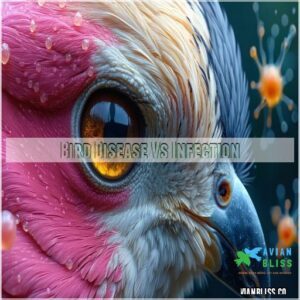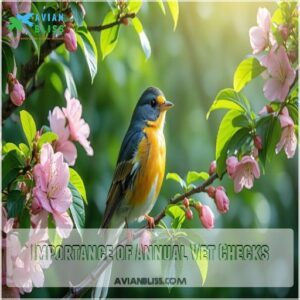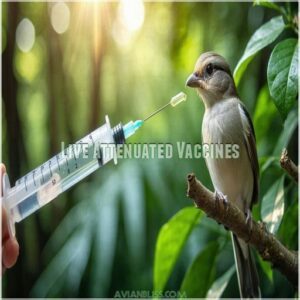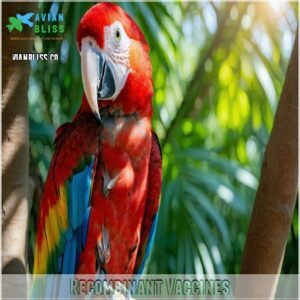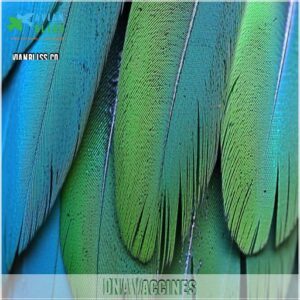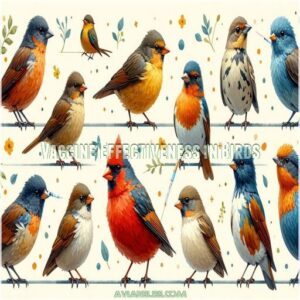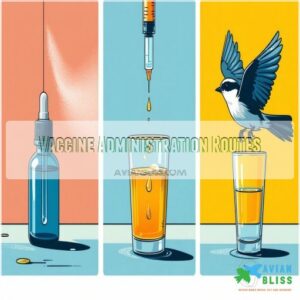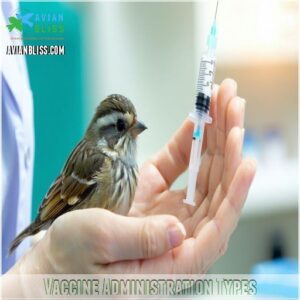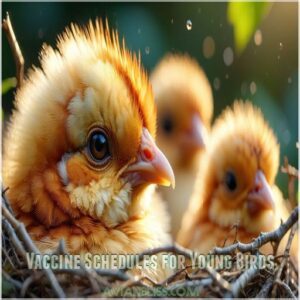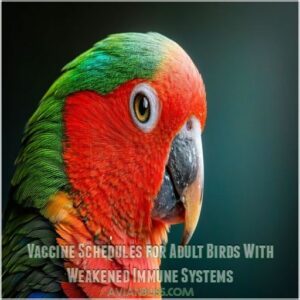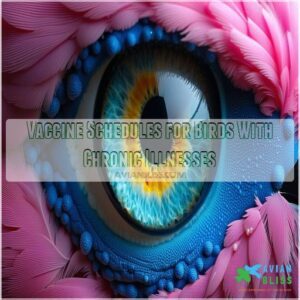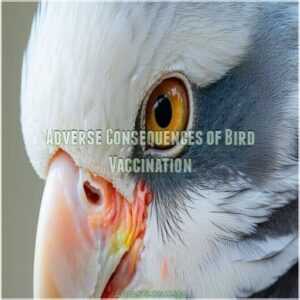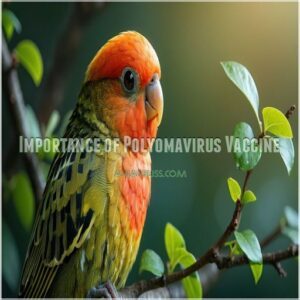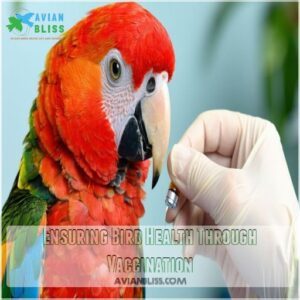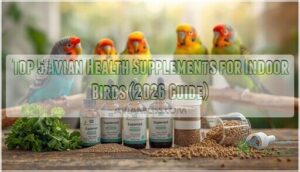This site is supported by our readers. We may earn a commission, at no cost to you, if you purchase through links.
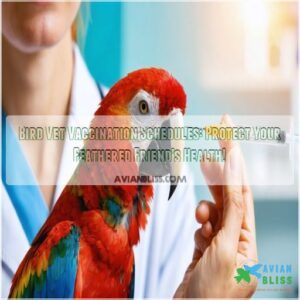
Most veterinarians recommend starting vaccinations around 21 days old, with the polyomavirus vaccine being particularly key for young chicks.
Different bird species have varying susceptibility and risk periods, so you’ll want a customized approach.
Annual vet checkups are essential for preventative care, helping detect potential infections early.
Not all birds need the same vaccines, so consult your avian veterinarian to create a personalized vaccination plan.
They’ll assess your bird’s specific risks and determine the most appropriate vaccination strategy to keep your winged companion healthy and protected.
Table Of Contents
- Key Takeaways
- Bird Disease Vs Infection
- Importance of Annual Vet Checks
- Types of Bird Vaccines
- Bird Vaccination Schedules
- Adverse Consequences of Bird Vaccination
- Importance of Polyomavirus Vaccine
- Ensuring Bird Health Through Vaccination
- Frequently Asked Questions (FAQs)
- What vaccines do birds need?
- Why do birds not have a regular vaccination schedule?
- What is a common vaccine for poultry?
- How often do you vaccinate your pets?
- Can all bird species receive the same vaccine?
- How do birds react after vaccination?
- Are bird vaccines completely safe and effective?
- What if my bird is already sick?
- Do indoor birds need regular vaccinations?
- Conclusion
Key Takeaways
- You’ll need to work closely with an avian veterinarian to create a personalized vaccination schedule, as each bird species has unique health requirements and risks.
- Young birds typically start vaccinations around 21 days old, with the polyomavirus vaccine being crucial for preventing potentially devastating infections in chicks.
- Not all birds require the same vaccines, and factors like age, health status, and individual immune response will determine the most appropriate vaccination strategy.
- Annual vet check-ups are essential for detecting potential infections early and maintaining your bird’s long-term health, even if they appear healthy on the surface.
Bird Disease Vs Infection
Understanding the difference between bird diseases and infections is essential for your feathered friend’s health.
Not every infection leads to disease.
By recognizing how infections can impact your bird’s immune system, you’ll be better equipped to protect and care for your avian companion.
Polyomavirus Infection in Birds
Ever wondered why some birds get sick while others remain healthy?
Polyomavirus is a sneaky viral infection that targets young birds, especially hand-reared chicks. It can spread silently through carrier birds, causing devastating consequences for vulnerable populations.
Vaccination, following a proper vaccination schedule, is essential for prevention.
| Bird Species | Susceptibility | Typical Age of Risk |
|---|---|---|
| Budgies | High | 25-30 days is incorrect, it is 10-25 days |
| Macaws | Moderate | Under 8 weeks |
| Caiques | Very High | All ages |
| Conures | High | Under 6 weeks |
| Eclectus | Moderate | Under 8 weeks |
Difference Between Infection and Disease in Birds
For your feathered friends, infection doesn’t always mean disease. Think of it like catching a cold—you might be exposed but not get sick. Some birds become asymptomatic carriers, harboring the virus without showing symptoms.
Understanding this difference is key to managing avian health and preventing serious complications.
| Infection Stage | Carrier Status | Potential Impact |
|---|---|---|
| Exposed | Possible | Mild to No Symptoms |
| Viral Presence | Likely | Varied Immune Response |
| Immune Development | Developing | Protection Building |
| Long-term Status | Monitored | Health Management |
Asymptomatic carriers, avian health, infection, disease
How Infection Affects Bird Health
Lurking beneath feather and bone, avian polyomavirus can transform from silent infection to devastating disease. Your bird’s health hangs in the delicate balance of immune response and viral aggression.
Early detection is key in preventing the progression of diseases, as parrots are masters at hiding parrot health issues symptoms, which can be found here: parrot health issues symptoms.
| Infection Stage | Immune Response | Potential Outcome |
|---|---|---|
| Asymptomatic | Strong | No visible disease |
| Mild Exposure | Moderate | Temporary symptoms |
| Severe Infection | Weakened | Serious health risks |
| Chronic Carrier | Compromised | Ongoing transmission |
| Fatal Progression | Collapsed | Potential mortality |
Understanding these nuances helps protect your bird’s precious life, and knowing these infection stages can make all the difference in the world.
Importance of Annual Vet Checks
Tracking your bird’s health isn’t just smart—it’s a lifeline.
Annual vet checks are your secret weapon in preventative care, catching sneaky infections before they become serious.
Your feathered friend might look healthy, but hidden health issues can lurk beneath the surface. These thorough exams include detailed checks like gram stains, blood work, and X-rays that spot low-grade infections early.
By investing in these yearly health screenings, you’re giving your bird the best chance at a long, vibrant life.
Types of Bird Vaccines
Understanding the different types of vaccines is key to protecting your bird’s health.
You’ll want to learn about the four main categories of vaccines that can help safeguard your feathered companion from potentially serious diseases.
Live Attenuated Vaccines
After your bird’s annual check-up, understanding live attenuated vaccines becomes key to protecting their health. These vaccines use weakened viruses that can’t cause full-blown disease but still trigger robust immunity.
Why live attenuated vaccines matter:
- Mimic natural infection without serious risks
- Provide long-lasting, powerful immune protection
- Reduce potential for chronic health complications
Your vet can help navigate the nuanced world of avian vaccination safety and efficacy.
Killed Vaccines
In the midst of bird vaccination options, killed vaccines stand out as a key safety measure for your feathered companions.
These vaccines use whole or partial inactivated organisms to stimulate immune responses without risking live virus transmission.
By incorporating vaccine adjuvants, they enhance bird vaccination efficacy, providing a reliable shield against potentially devastating avian diseases.
Recombinant Vaccines
Moving beyond killed vaccines, let’s explore recombinant vaccines – the cutting-edge heroes of bird vaccination.
These genetic wizards remove disease-causing genes, creating safer alternatives for your feathered friends.
They’re a game-changer in psittacine bird vaccines, offering robust immunity without the risks of traditional live vaccines.
Your parrot’s protection just got smarter.
DNA Vaccines
Building on recombinant vaccine technology, DNA vaccines represent a cutting-edge approach to bird health protection. These innovative vaccines inject genetic instructions directly into your bird’s cells, triggering a powerful immune response.
Here’s what makes DNA vaccines a game-changer:
- Precise genetic targeting
- Reduced risk of infection
- Minimal side effects
- Customizable immune response
- Advanced disease prevention mechanism
By incorporating DNA vaccines into your bird’s health regimen, you can also help them receive a balanced diet that complements the vaccine’s effects.
Vaccine Effectiveness in Birds
Not all bird vaccines work the same way, and their effectiveness varies widely across different species and age groups.
Vaccine efficacy depends on factors like the bird’s immune system, age, and previous exposure to infections.
Carrier birds might respond differently to vaccines compared to naive birds, making individual assessment essential for maintaining the best possible immunity duration.
Bird Vaccination Schedules
Protecting your bird’s health starts with understanding the right vaccination schedule suited to their unique needs.
By working closely with your avian veterinarian, you’ll provide your feathered friend with the precise immunizations that can prevent serious diseases and promote long-term wellness.
This ensures proper vaccination.
Vaccine Administration Routes
Multiple routes exist for delivering vaccines to birds, each designed to specific health needs.
Intranasal spray methods work well for respiratory issues, while oral techniques through drinking water simplify flock-wide immunization.
Your avian vet might choose injection sites like subcutaneous or wing web for targeted immune responses. For example, a Poultry Vaccination Program may include day-old Marek’s disease vaccination via the subcutaneous route.
These diverse administration approaches provide thorough protection in bird vaccination programs.
Vaccine Administration Types
Bird vaccination uses several administration types to keep your feathered friend healthy.
Veterinarians typically use subcutaneous and intramuscular injection routes to deliver avian vaccines. These methods guarantee precise dosage amounts and ideal safety protocols, allowing targeted immune system stimulation for maximum protection against potential diseases.
Regular check-ups with an avian veterinarian will help you stay on top of your bird’s vaccination schedule and overall health.
Vaccine Schedules for Young Birds
Nestling health is a tightrope walk where early vaccination can be your safety net.
Your young feathered friend’s immune response depends on precise timing and dosage amounts. Vaccine safety is paramount in protecting against avian infections during these vulnerable weeks.
The bird vaccination schedule for chicks typically starts around 21 days, with key polyomavirus vaccines repeated two weeks later. bird vaccination schedule and polyomavirus vaccines are key.
Vaccine Schedules for Adult Birds With Weakened Immune Systems
After exploring young birds’ vaccination needs, let’s zero in on our feathered friends battling weakened immune systems.
Your vet might recommend customized bird vaccination schedules with immune support strategies.
Dosage adjustments and frequency changes become critical, focusing on personalized risk assessment to prevent avian disease while protecting your bird’s fragile health.
Vaccine Schedules for Birds With Chronic Illnesses
If your feathered friend battles chronic illness, bird vaccination schedules need careful tweaking.
Your avian vet will customize dosage considerations based on your bird’s unique immune response.
Monitoring recovery becomes key when adjusting bird health vaccines.
Some chronic conditions might require modified bird vet vaccination schedules to prevent additional avian disease complications.
Adverse Consequences of Bird Vaccination
While vaccines play a vital role in protecting your bird’s health.
They can occasionally trigger unexpected side effects that you’ll need to watch for carefully.
Understanding these potential adverse consequences will help you make informed decisions and work closely with your veterinarian to safeguard your feathered friend’s well-being.
Vaccine Reactions in Birds
When planning bird vaccination schedules, understanding vaccine reactions is key to keeping your feathered friend safe.
You’ll want to watch for potential hiccups that might pop up after immunization.
Some common reactions include:
- Mild swelling at the injection site
- Temporary feather loss near vaccination area
- Short-term lethargy or decreased appetite
- Slight increase in body temperature
- Momentary behavioral changes
Stay alert and chat with your vet about any concerns.
Vaccine Side Effects in Birds
After exploring vaccine reactions, let’s unpack the potential side effects that might ruffle your bird’s feathers.
Rare but possible, these can include injection site swelling, temporary feather loss, or unusual behavior.
Understanding bird flu vaccine side effects can help you prepare for any adverse consequences.
While parrot vaccination risks exist, the benefits often outweigh complications.
Your vet can help you safeguard your feathered friend’s health and happiness.
Vaccine Interactions With Other Medications
Vaccine side effects might leave you worried, but understanding medication interactions is key to your bird’s safety.
When managing your feathered friend’s health, watch out for potential drug conflicts during vaccination:
- Antibiotics can alter vaccine effectiveness
- Steroids may suppress immune response
- Antiparasitic drugs might interfere with vaccine absorption
- Chronic medication can impact vaccination timing
- Herbal supplements could modify vaccine reactions
Always consult your avian vet about your bird’s specific medication profile.
Vaccine Contraindications in Birds
Some medications and health conditions can sideline your bird’s vaccination plans.
Immunocompromised birds, those on steroids, or with active infections might need special considerations.
Your vet can help navigate breed susceptibility and potential immune system impacts.
Always disclose your bird’s full medical history to prevent unexpected vaccine interactions and guarantee safe avian disease prevention.
Importance of Polyomavirus Vaccine
Protecting your bird from the devastating effects of polyomavirus starts with understanding its critical importance in avian health.
You’ll want to talk to your vet about vaccination schedules that can shield your feathered friend from this potentially fatal disease, especially for young and vulnerable birds.
Polyomavirus Vaccine Effectiveness
Understanding the complexities of polyomavirus vaccine effectiveness reveals critical insights for bird owners.
Research shows varied outcomes across different parrot species.
Vaccine efficacy depends on multiple factors:
- Age-specific immune responses
- Individual bird carrier status
- Antibody development patterns
- Long-term immunity potential
Understanding these nuanced dynamics helps you make informed vaccination decisions for your feathered companion’s health and protection.
Polyomavirus Vaccine Administration
After exploring polyomavirus vaccine effectiveness, let’s take a closer look at administering this critical protection for your feathered friends.
The right approach can make all the difference in preventing deadly infections like Avian Polyomavirus (APV diagnosis methods).
Here’s a quick guide to polyomavirus vaccine administration for bird owners:
| Age Group | Vaccination Timing | Recommended Approach |
|---|---|---|
| Chicks | >35 days | Two-dose series |
| Breeding Birds | Off-season | 2-week interval doses |
| Neonates | Pre-weaning | Highest priority |
| Adult Birds | Annually | Seroconversion check |
| High-Risk Species | As recommended | Veterinarian guidance |
Your bird’s health depends on precise, professional vaccination strategies that protect against potential viral threats, and veterinarian guidance will be crucial in this case.
Polyomavirus Vaccine Side Effects
Some birds might experience minor polyomavirus vaccine reactions that’ll make you sit up and take notice.
Swelling at the injection site can occur, with rare cases of dermal tumors developing.
Watch for allergic responses and mild discomfort.
While these side effects sound scary, they’re typically manageable and far less risky than leaving your feathered friend unprotected against potentially fatal polyomavirus infections.
Polyomavirus Vaccine Contraindications
In the delicate world of parrot vaccination, understanding polyomavirus vaccine contraindications is essential for your bird’s immune safety.
Immunocompromised birds, those with active infections, or extremely young nestlings mightn’t be ideal candidates.
Consult your avian veterinarian to assess your specific bird’s immune status, species variations, and potential side effects before proceeding with vaccination.
Ensuring Bird Health Through Vaccination
Protecting your bird’s health is a critical responsibility.
It starts with a thorough vaccination strategy, developed specifically for your feathered friend’s needs.
By working closely with an avian veterinarian and following recommended vaccination schedules, you’ll help safeguard your bird against potentially life-threatening diseases.
This will support a longer, healthier life for your feathered friend.
How Vaccination Helps Prevent Bird Diseases
Vaccination acts like a shield, protecting your feathered friend from devastating diseases.
By strategically introducing specific vaccine types, you’re boosting your bird’s immunity and creating a robust defense against life-threatening conditions.
The right vaccination schedule can dramatically reduce disease risks, ensuring your avian companion stays healthy, happy, and resilient against potential health threats.
How Vaccination Helps Prevent Bird Infections
Battling bird infections starts with smart vaccination strategies.
Different vaccine types help build robust immunity, blocking transmission routes before infections take hold.
Your feathered friend needs protection against sneaky pathogens like avian polyomavirus that can silently spread.
Recognizing parrot illness symptoms early is also key in maintaining their health.
By following a customized vaccination schedule, you’re creating a powerful shield that keeps your bird healthy and disease-free.
How Vaccination Helps Promote Bird Health
Every bird owner’s dream is a healthy, thriving companion.
Vaccines play a vital role in promoting bird health by boosting avian immunity and preventing potential diseases.
Consider these key benefits:
- Strengthens immune system defenses
- Reduces risk of chronic infections
- Supports long-term wellness
A strategic vaccination approach helps your feathered friend stay vibrant and resilient against health challenges.
How Vaccination Helps Prevent Bird Death
Vaccination can shield your feathered companions from deadly diseases, dramatically reducing mortality risks.
By strategically following bird vaccination schedules, you’ll build essential immunity against avian polyomavirus and other life-threatening infections.
Protecting individual birds contributes to overall flock health, ensuring your winged friends stay vibrant, healthy, and safe from preventable diseases that could cut their lives tragically short.
Frequently Asked Questions (FAQs)
What vaccines do birds need?
You’ll want to work closely with an avian vet to determine your bird’s specific vaccine needs.
Psittacine birds may benefit from the polyomavirus vaccine, while annual checkups help catch potential health issues early.
Why do birds not have a regular vaccination schedule?
Like a cautious gardener protecting delicate seedlings, bird owners often skip routine vaccinations because each species has unique health needs and vaccine availability remains limited.
Consulting an avian vet helps navigate these complex immunization challenges.
What is a common vaccine for poultry?
Newcastle disease vaccine is a common poultry immunization that protects your flock from a highly contagious viral infection.
Veterinarians recommend administering it through water, spray, or injection to prevent widespread respiratory and neurological complications.
How often do you vaccinate your pets?
Vaccinate yearly or as your vet recommends. Different pets need different shots, so you’ll want to chat with a professional who knows your furry friend’s specific health needs and risks.
Can all bird species receive the same vaccine?
Not all birds can receive the same vaccines.
You’ll need to consult an avian veterinarian who can recommend species-specific immunizations.
as each bird type has unique health requirements and vaccine sensitivities.
How do birds react after vaccination?
Worried your feathered friend might feel under the weather after a shot?
Most birds experience mild reactions like temporary lethargy or slight swelling.
They’ll bounce back quickly, so don’t stress—your vet’s got their back.
Are bird vaccines completely safe and effective?
Bird vaccines aren’t 100% foolproof, but they’re generally safe.
You’ll want to work closely with an avian vet, monitor your bird’s reactions, and weigh individual risks against potential health benefits for your feathered friend.
What if my bird is already sick?
With 80% of sick birds recovering through proper care, consult your vet immediately.
They’ll assess your bird’s condition, recommend personalized treatments, and adjust vaccination plans to support its immune system during illness.
Do indoor birds need regular vaccinations?
You’ll want yearly vet check-ups for indoor birds, but most don’t need routine vaccinations.
Your avian vet can assess specific risks and recommend personalized preventive care suited to your feathered friend’s unique health needs.
Conclusion
Protecting a pet bird means safeguarding a feathered family member.
Prioritizing Your Precious Plumage: Regular check-ups, timely vaccines, and proactive health monitoring will help prevent diseases, boost immunity, and keep your winged companion vibrant and healthy for years to come.
Trust your avian veterinarian to craft a personalized vaccination strategy suited to your bird’s unique needs.

